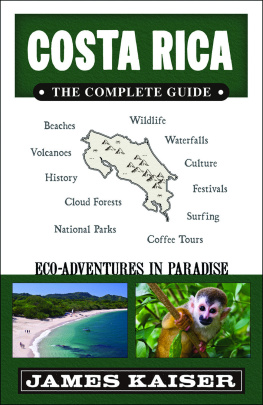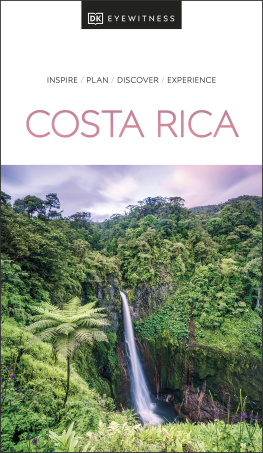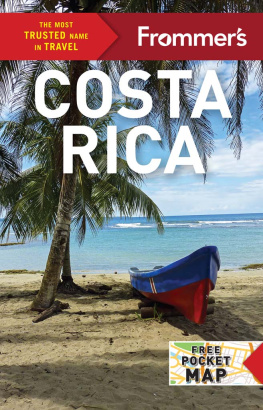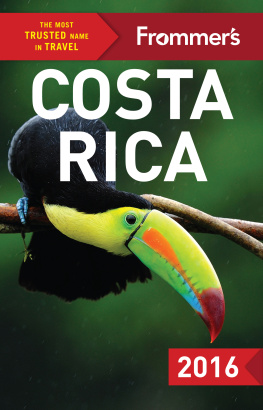Published by Louisiana State University Press
lsupress.org
Copyright 2021 by Lowell Gudmundson
All rights reserved. Except in the case of brief quotations used in articles or reviews, no part of this publication may be reproduced or transmitted in any format or by any means without written permission of Louisiana State University Press.
Spanish edition published as Costa Rica despus del caf: La era cooperativa en la historia y la memoria (2018), by Universidad Estatal a Distancia (UNED), Costa Rica.
Designer: Laura Roubique Gleason
Typeface: Minion Pro
Cover image: iStock, MattiaATH.
Library of Congress Cataloging-in-Publication Data
Names: Gudmundson, Lowell, author.
Title: Costa Rica after coffee : the co-op era in history and memory / Lowell Gudmundson
Other titles: Costa Rica despus del caf. English
Description: Baton Rouge : Louisiana State University Press, [2021] | Spanish edition published as Costa Rica despus del caf: La era cooperativa en la historia y la memoria (2018), by Universidad Estatal a Distancia (UNED), Costa Rica. | Includes bibliographical references and index.
Identifiers: LCCN 2021010910 (print) | LCCN 2021010911 (ebook) | ISBN 978-0-8071-7625-2 (cloth) | ISBN 978-0-8071-7641-2 (paperback) | ISBN 978-0-8071-7677-1 (pdf) | ISBN 978-0-8071-7678-8 (epub)
Subjects: LCSH: CooperationCosta Rica. | Agriculture, CooperativeCosta Rica. | Coffee industryCosta RicaHistory20th century.
Classification: LCC HD3454.A4 G8313 2021 (print) | LCC HD3454.A4 (ebook) | DDC 334.097286dc23
LC record available at https://lccn.loc.gov/2021010910
LC ebook record available at https://lccn.loc.gov/2021010911
Acknowledgments
My informants, whose patience and generosity were legendary, deserve thanks first. I learned many valuable lessons from them, not just historical but also personal: how not only people but objects, photographs, landscapes, and homes hold profoundly significant memories and histories; how to value the past without failing to live in the present, in order to face a future with the same optimism, humor, and energy that made that fruitful past possible. I shared many pleasant moments with them that I will never forget.
My colleagues and friends in this enterprise at the Universidad Nacional in Heredia, Wilson Picado Umaa and Jos Antonio Salas Vquez, deserve equal thanks. One might say, and not only in jest, that the former corrected my mistakes about Tarraz and the latter my errors about Heredia. But we are joined by bonds deeper than geography or academics. The three of us were born and grew up in family farming zones and, owing to that accident of birth, share a whole series of almost inherited, inescapable personal questions. Carmen Kordick, another researcher of Tarraz topics, contributed in different ways to the successful completion of this book, for which I thank her as well. The original version of this book in Spanish was stylistically improved by my friend and colleague Mauricio Melndez Obando. In truth, however, he corrected much more than my Spanish prose contaminated by English syntax, especially with his unsurpassed knowledge of Heredias family genealogies. Something similar must be said in thanks to Todd Manza, my copy editor with Louisiana State University Press, for turning my translation into a far more readable English.
I gratefully acknowledge the institutional support I have received to carry out this project: from the Howard Heinz Endowment of the University of Pittsburgh, the Schools of History of the Universidad Nacional and the Universidad de Costa Rica, the National Archives of Costa Rica, and the University of Oklahoma for the digitization of the 1927 and 1955 censuses in the late 1980s and early 1990s. None of this would have been possible without the firm support of then director of the archives, Luz Alba Chacn de Umaa, and her colleague Cecilia Arce. I will never forget the moment in 1986 when, after several months of transcribing probate records, they invited me for a visit to the basement of the old archive building in the center of San Jos to confirm the finding of the originals of the 1927 census, which led later to the discovery of the microfilm rolls of the agricultural census of 1955.
The long road to the reformulation of the project based on informant interviews would not have been possible without the fellowship provided by the National Endowment for the Humanities for academic year 20082009, as well as the sabbatical leaves and research funds for travel and assistants over two decades by Mount Holyoke College. I have deposited digital copies of the original images and large-scale databases from both censuses with the History Schools of the Universidad Nacional and the Universidad de Costa Rica, more than one thousand probate inventories, the recorded and transcribed informant interviews, together with images of the informants and many of their own personal documents and photographic collections. I hope future generations will be able to use this data for their own research projects.
I am grateful for the support of the staff of the Editorial de la Universidad Estatal a Distancia in Costa Rica for the initial Spanish edition of the book, in particular its then director, Ren Muios Gual. I was fortunate enough to publish my first book with the newly founded EUNED in 1978. Their continued interest in this project and the professionalism they have always showed greatly aided in its initial publication in Spanish. It was always a pleasure to visit with Ren at the EUNED on my various visits to Costa Rica, receiving not just words of encouragement but also displays of patience and confidence in a successful outcome, a confidence that, to tell the truth, I did not always share.
This edition in English with Louisiana State University Press owes its existence to the efforts of editor Jenny Keegan. Our paths crossed once again quite serendipitously. I had previously benefited from Jennys editorial skills when she served as an editor for the multivolume Dictionary of Caribbean and Afro-Latin American Biography at Harvard. Commissioning, gathering, and editing the more than one hundred biographical entries for Central America was made much easier by her guidance, and when I approached the press with the idea for an English version of Costa Rica After Coffee, it was a great pleasure to work with her once again. She has been the guiding force for the completion of the project and the simultaneous reissuing of Costa Rica Before Coffee, my first book in English. Nothing could have made me happier than to see these twin studies appear together, bookends to a nearly half-century career living in and writing about Costa Rica. Back when that first book appeared, and for some years thereafter, I was fond of saying that I had lived the better part of my adult life in Costa Rica, both literally and figuratively. Even today, there is a great deal of truth to the statement.
My Costa Rican family, extended and immediate, deserves not just thanks but a share of the responsibility for whatever successes there may be in the text. Over the years, conversations with my sisters-in-law, Alicia and Doris, and brothers-in-law, Jorge, Alfredo, and Harry, offered many perspectives on the experience of the 1970s and 1980s. Among so many nieces and nephews of the next generation, Gabriel, Valeria, and Max, in particular, helped me to better understand this new world they inherited and that is being transformed in their own image. Closer still, in my own household, Cecilia and our children, Paula and Darryl, have been the indispensable motivation to reflect on and write about the country of their birth and its destiny. Thankfully, our children grew up in an era when telephones were mobile but not yet intelligent, so that from an early age we developed the habit of sharing long conversations. They both knew up close the family and farm in North Dakota where I was born and grew up and, for that reason, the origin of certain of my rural obsessions and ways of seeing the world.








